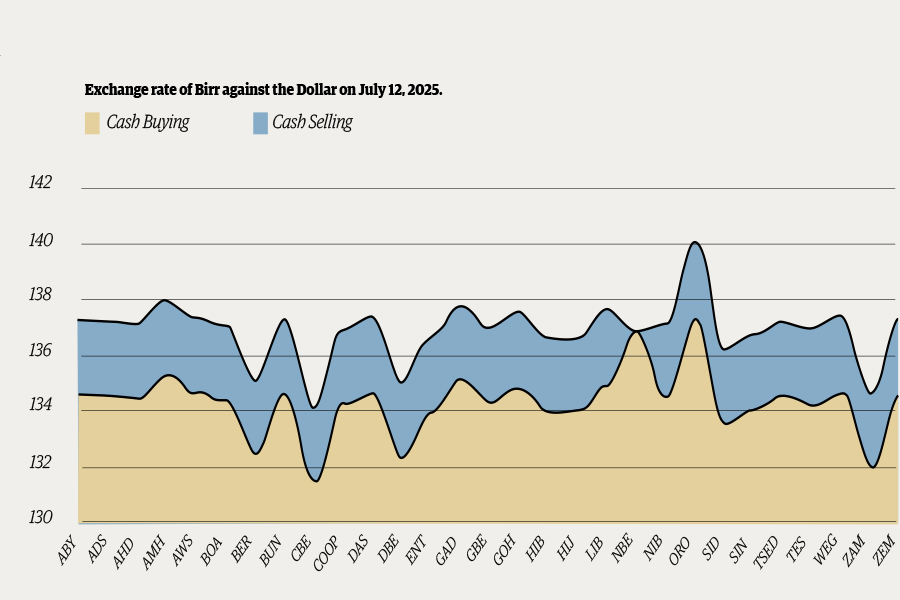
Commentaries | Oct 02,2021
Apr 28 , 2024
By Abiy Getachew
The recent directive unveiled by the Ethiopian Investment Board (EIB) marks a considerable shift in policy by the federal government. Its timing and scope opened several previously restricted sectors to foreign investors, with foreboding implications for domestic companies and consumers.
The directive notably welcomes foreign capital in the export of essential commodities, including raw coffee, khat, oilseeds, and pulses, albeit under specific conditions. It also allows foreign nationals and companies to engage in wholesale trade across a broad spectrum of sectors, except for fertiliser and petroleum imports, which remain exclusively in the hands of domestic investors. The policy change could not have come at a more critical juncture as Ethiopia strives to stabilise its currency and continues its negotiations with the International Monetary Fund (IMF) for a new loan program. Such economic measures are essential for maintaining the country's financial stability and promoting an environment conducive to investment and growth.
Drawing on the economic principle of comparative advantage, Ethiopia’s approach mirrors the liberalisation efforts of other African countries like Ghana and Nigeria, which opened their economies to foreign capital to catalyse growth and development in past decades. Ghana's economic reforms in the 1980s and Nigeria's in the 2000s reduced trade barriers and encouraged a more attractive climate for international investors. These countries leveraged their natural resources and consumer markets to attract foreign capital, propelling economic diversification and bolstering global competitiveness.
Ghana and Nigeria's success stories should provide a compelling cue for Ethiopia; embracing its comparative advantages could similarly enhance its economic stature on the world stage. The influx of foreign capital is expected to bring substantial investment and valuable expertise, setting the stage for increased productivity in domestic industries. Companies are now compelled to upgrade their competitiveness and operational efficiencies to thrive amid increased international competition. The environment should encourage a beneficial exchange of knowledge and skills between domestic companies and their foreign counterparts, potentially leading to progress in local expertise and business practices.
The impact on consumers is expected to be no less positive. The entry of foreign businesses will likely lead to greater product variety, enhanced quality, and more competitive pricing. Such changes are anticipated to elevate the consumer experience, providing them access to a broader array of goods at potentially lower prices. The dynamic of increased competition could drive down costs while promoting a culture of quality improvement in production.
However, the long-term effects of this shifting policy on domestic businesses and the broader consumer base are yet to be fully determined. As the market adjusts to the presence of international market actors, the ongoing interactions between investor activities, local economic conditions, and consumer preferences will play a crucial role in shaping the future economic landscape. Monitoring these developments will be key to understanding the enduring impacts of foreign capital on the economy and the public.
As policymakers pursue their ambitious economic reforms, foreign capital's indispensable role in driving growth and stability remains. This strategic move is expected to unlock numerous economic benefits for local businesses and consumers, setting the stage for a period of robust growth and enhanced competitiveness.
PUBLISHED ON
Apr 28,2024 [ VOL
25 , NO
1252]


Commentaries | Oct 02,2021

Radar | Oct 27,2024

My Opinion | Sep 21,2024

Advertorials | Sep 24,2024

Commentaries | Feb 18,2023

In-Picture | Jul 08,2024

Money Market Watch | Jul 13,2025

Editorial | Mar 11,2023

Fortune News | Jul 17,2022

Radar | Apr 30,2024

Photo Gallery | 170076 Views | May 06,2019

Photo Gallery | 160324 Views | Apr 26,2019

Photo Gallery | 149928 Views | Oct 06,2021

My Opinion | 136225 Views | Aug 14,2021





Dec 22 , 2024 . By TIZITA SHEWAFERAW
Charged with transforming colossal state-owned enterprises into modern and competitiv...

Aug 18 , 2024 . By AKSAH ITALO
Although predictable Yonas Zerihun's job in the ride-hailing service is not immune to...

Jul 28 , 2024 . By TIZITA SHEWAFERAW
Unhabitual, perhaps too many, Samuel Gebreyohannes, 38, used to occasionally enjoy a couple of beers at breakfast. However, he recently swit...

Jul 13 , 2024 . By AKSAH ITALO
Investors who rely on tractors, trucks, and field vehicles for commuting, transporting commodities, and f...

Oct 4 , 2025
Eyob Tekalegn (PhD) had been in the Governor's chair for only weeks when, on Septembe...

Sep 27 , 2025
Four years into an experiment with “shock therapy” in education, the national moo...

Sep 20 , 2025
Getachew Reda's return to the national stage was always going to stir attention. Once...

Sep 13 , 2025
At its launch in Nairobi two years ago, the Africa Climate Summit was billed as the f...

Oct 5 , 2025 . By NAHOM AYELE
In Meqelle, a name long associated with industrial grit and regional pride is undergo...

Oct 5 , 2025 . By BEZAWIT HULUAGER
The federal government is set to roll out a new "motor vehicle circulation tax" in th...

Oct 5 , 2025 . By NAHOM AYELE
The Bank of Abyssinia is wrestling with the loss of a prime plot of land once leased...

Oct 5 , 2025 . By BEZAWIT HULUAGER
The Customs Commission has introduced new tariffs on a wide range of imported goods i...